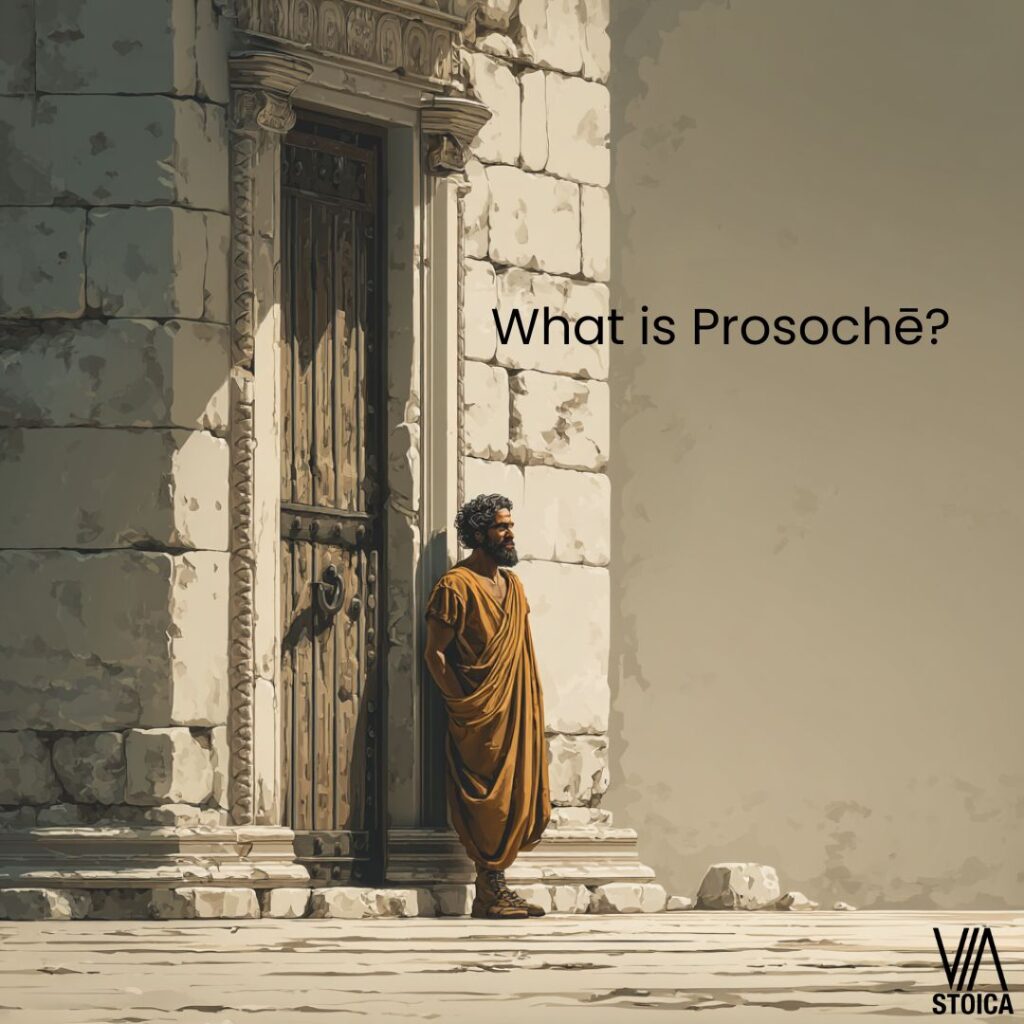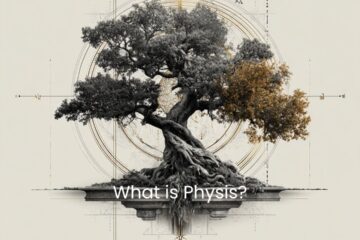What is Prosoche

In Stoicism, Prosochē (προσοχή) is the practice of constant attention, being watchful over your thoughts, judgments, and actions. It is a form of mindful awareness, not in the modern meditation sense, but as a vigilant state of moral alertness. For the Stoics, living well requires never letting your mind drift unconsciously. Every moment is a chance to check whether your actions align with virtue.
In today’s world of distractions, Prosoche is one of the most relevant Stoic practices. It reminds us to pause, notice what we are doing, and choose wisely instead of living on autopilot.
Breaking Down the Word
Prosochē (προσοχή) comes from the Greek verb proséchō (προσέχω), which means “to attend to,” “to apply oneself,” or “to hold toward.” Literally, it suggests directing your attention toward something with care and focus.
Philosophically, the Stoics used Prosochē to mean a constant state of attentiveness to your inner life. It was not passive observation but active watchfulness, like a guard standing at the gate of the mind. This mattered because Stoicism teaches that our judgments, not external events, shape our lives. Attention is the discipline that keeps us from slipping into false beliefs and harmful emotions.
Key Dimensions of Prosochē
Prosoche can be understood through several dimensions:
- Attention to Impressions – Noticing every thought and external impression before giving assent.
- Attention to Action – Asking whether what you are about to do is virtuous, reasonable, and in accordance with nature.
- Attention to the Present Moment – Anchoring yourself in now, rather than worrying about the past or the future.
- Attention to Self-Governance – Maintaining awareness of your ruling faculty (hegemonikon) and whether it is being used properly.
Prosochē as the Stoic Pause
One way to understand prosoche is to see it as the Stoic pause. When an impression strikes, an insult, a craving, a sudden fear, our natural tendency is to react instantly. The pause interrupts this chain. It is the moment of watchful attention before we give assent, allowing reason to step in.
Epictetus compared it to a guard at the gates: impressions come knocking, but not every visitor deserves entry. With prosoche, you stop, check their identity, and admit only what aligns with truth and virtue.
This pause is not hesitation or inaction. It is a conscious breath between impulse and choice. In that small space, freedom appears, the freedom to act in accordance with your highest principles instead of being dragged around by emotion or habit.
Core Stoic Principles
Prosochē is inseparable from the central ideas of Stoicism:
- Assent (συγκατάθεσις): Prosochē is the attentiveness that comes before assent. By pausing before we agree with impressions, we protect ourselves from false judgments.
- Impressions (φαντασίαι): Attention means catching impressions as they arise, like a guard at the gate, and testing whether they are true and worth admitting.
- Hegemonikon (ἡγεμονικόν): This ruling faculty of the mind is the seat of reason. Prosochē safeguards it, keeping it free from distortion and able to act in harmony with nature.
- Virtue (ἀρετή): The goal of Stoic practice is living according to virtue. Constant attention ensures that our choices align with wisdom, justice, courage, and temperance.
Modern Misunderstandings
It is easy to confuse Prosoche with modern “mindfulness.” While both involve awareness, Stoic attention is not about relaxation or stress reduction; it is about moral vigilance. Another misunderstanding is to think that attention means obsessive self-monitoring. The Stoics aimed for steady awareness, not anxious perfectionism.
Why It’s Central to Stoicism
Epictetus constantly emphasized Prosoche. In the Discourses, he warns:
“When you relax you attention for a while, do not fancy you will recover it whenever you please; but remember this, that because of your fault of today your affairs must necessarily be in a worse condition on future occasions.”
Epictetus, Discourses, Book 4, Chapter 12.1
This vigilance is not occasional; it is continuous training. Without attention, Stoic philosophy collapses into theory. With attention, every moment becomes philosophy in practice.
Practical Applications
Here are a few ways to cultivate Prosochē today:
- Morning reminder: Begin your day by stating, “Today I will pay attention to my judgments.”
- Stop and check: Before acting, pause and ask, “Is this in line with virtue?”
- Journaling prompt: Each evening, reflect on where you paid attention well and where you slipped into distraction.
- Distraction filter: When your phone, news, or emotions pull you, practice the Stoic pause before reacting.
FAQ Section
What does Prosochē mean in Stoicism?
It means vigilant attention to your inner life, impressions, and actions, ensuring they remain in harmony with reason and virtue.
Is Prosochē the same as mindfulness?
Not exactly. Stoic attention is focused on moral awareness and reason, not simply on presence or relaxation.
Can anyone develop Prosochē?
Yes. Like any discipline, it requires training and practice, but every person is capable of strengthening their attention.
Conclusion
Prosochē is the heartbeat of Stoic practice, the art of paying attention to how you live. In a noisy, fast-moving world, it calls us back to simplicity: notice your thoughts, guard your choices, and act with virtue. Small, daily acts of attention add up to a life that is more intentional, resilient, and free.
Want to explore more Stoic strategies?
Book a free consultation with one of our Stoic Coaches or learn about more Stoic philosophy terms. You can also listen to the Via Stoica podcast on Spotify or Apple Podcasts or watch it on YouTube.



0 Comments